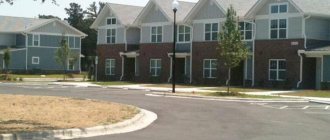Who can decide whether to recognize houses as unsafe?
The new rules are outlined in the Decree of the Government of the Russian Federation dated April 24, 2020 No. 581 “On amending paragraph 7 of the Regulations on recognizing premises as residential premises, residential premises unsuitable for habitation, an apartment building in disrepair and subject to demolition or reconstruction, a garden house as a residential building and a residential building garden house."
Question and answer How can residents of a dilapidated house stop paying for major repairs?
In this document, the government clarified who makes the decision to recognize a residential premises as unfit for habitation, and an apartment building as unsafe and subject to demolition or reconstruction.
The resolution states that if an assessment is carried out on objects of the housing stock of the Russian Federation, as well as an apartment building located in federal ownership, then the decision is made by the federal executive body exercising the powers of the owner of the property. If the property belongs to a federal executive body or its subordinate enterprise (institution), then the decision is made by this body.
When a house is demolished, how are apartments given to the owners?
Hello Julia! From the contents of the provisions of Article 32 of the Housing Code of the Russian Federation and the explanations contained in paragraphs 20, 22 of the Resolution of the Plenum of the Supreme Court of the Russian Federation dated July 2, 2009 N 14 “On some issues that arose in judicial practice when applying the Housing Code of the Russian Federation”, it follows that owner living in a house recognized as unsafe and subject to demolition, the residential premises can either be withdrawn by redemption, or, by agreement with the owner, he can be provided with another residential premises with its value included in the redemption price, subject to compliance with the preliminary procedure as directed by the local authority self-government to the owners of residential premises requirements for the demolition of a dilapidated house or its reconstruction, and the subsequent adoption by a local government body of a decision to confiscate the land plot on which the dilapidated house is located, and each residential premises located in such a house, if the owners of residential premises in this house do not fulfilled the requirement for its demolition or reconstruction. In this case, another residential premises, instead of the one seized, can be provided to the owner only if there is an appropriate agreement reached with the local government, and only with its value included in the redemption price (Part 8 of Article 32 of the Housing Code of the Russian Federation). At the same time, if a residential building recognized as unsafe and subject to demolition is included in the regional targeted program for the resettlement of citizens from emergency housing stock, then the owner of the residential premises in such a house by virtue of paragraph 3 of Article 2, Article 16 of the Federal Law of July 21, 2007 N 185-FZ “On the Fund for Assistance to the Reform of Housing and Communal Services” has the right to provide another residential premises or buy them out. In this case, the owner of the residential premises has the right to choose any of the above methods of ensuring his housing rights. The redemption price of the seized residential premises is determined according to the rules established by part 7 of Article 32 of the Housing Code of the Russian Federation, and includes the market value of the residential premises, losses caused to the owner by its seizure, including lost profits, as well as the amount of compensation for major repairs not made. When determining the redemption price of the seized residential premises, the value of the share in the ownership of the common property in the house to be demolished, including the share in the ownership of the land plot, must be taken into account. As a general rule, the redemption price of residential premises, terms and other conditions of redemption are determined by agreement with the owner of the residential premises (Part 6 of Article 32 of the Housing Code of the Russian Federation). If a dispute arises about the amount of the redemption price, the market value of the residential premises must be established according to the rules provided for by Federal Law No. 135-FZ of July 29, 1998 “On Valuation Activities in the Russian Federation.”
Which apartment buildings are considered unsafe?
The grounds for recognizing an apartment building as unsafe and subject to demolition or reconstruction are listed in Decree of the Government of the Russian Federation dated January 28, 2006 N 47. This is the emergency technical condition of its load-bearing building structures or the apartment building as a whole. It is characterized by damage to load-bearing structures and their deformations, which indicate the exhaustion of the load-bearing capacity and the danger of collapse of an apartment building, or tilting, which can cause a loss of stability of the house.
In addition, apartment buildings located in dangerous zones of landslides, mudflows, snow avalanches, as well as in areas that are annually inundated by flood waters and in which it is impossible to prevent flooding using engineering and design solutions are recognized as unsafe. Those apartment buildings that are located in the zone of probable destruction during man-made accidents are also recognized as emergency if it is impossible to prevent the destruction of residential premises using engineering and design solutions.
If an apartment building has been declared unsafe and subject to demolition or reconstruction, then its residential premises are unsuitable for habitation.
It follows from Article 89 of the Housing Code of the Russian Federation that instead of a residential premises recognized as unfit for habitation (a residential building is recognized as unsafe and subject to demolition), another residential premises is provided under a social tenancy agreement, which must be:
— landscaped in relation to the conditions of the relevant locality;
- equivalent in total area to the previously occupied residential premises;
— the housing provided must meet established requirements and be located within the boundaries of a given locality.
Will the housing offered for relocation be considered equivalent to the previously occupied one in the following cases:
— is there no kindergarten or school in the area where the proposed housing is located?
- absence of hospitals (medical institutions) in the area where the proposed residential premises are located?
— remoteness of the proposed housing from the city or village center?
— remoteness of the proposed housing from the place of education or work of the employer or his family members?
Answer:
The Housing Code of the Russian Federation does not contain clear requirements for the equivalence of the proposed replacement for demolished residential premises (except for those contained in Article 89 of the Housing Code of the Russian Federation). The understanding of “equivalence” is developed by judicial practice.
For example, in the Review of Judicial Practice dated April 29, 2014, the Supreme Court of the Russian Federation noted that such objections to relocation to the proposed housing as:
— insufficient number of children’s educational institutions or medical institutions of a certain profile in the area of the proposed residence;
— distance from the center of the settlement, places of education or work,
are not a basis for the conclusion that these circumstances lead to a deterioration in living conditions . Such objections, according to the Supreme Court of the Russian Federation, are not rightfully taken into account by the courts when considering cases of eviction with the provision of other housing.
At the same time, this Review of Practice provides an example where the court refuses to evict, having come to the conclusion that eviction from an apartment located on the 1st floor of the building to an apartment located on the top floor of the building (17th floor) will lead to a deterioration in living conditions , since the defendant is disabled and needs a wheelchair, and therefore, for health reasons, he is recommended to live on the lower floors of apartment buildings.
For more information about this, see section 3 of the “Review of judicial practice in cases related to ensuring the housing rights of citizens in the event of a residential building being recognized as unsafe and subject to demolition or reconstruction,” approved by the Presidium of the Supreme Court of the Russian Federation on April 29, 2014.
Return to the beginning of the review of practice: “Resettlement of an emergency house, provision of housing. Judicial practice of the RF Armed Forces"
What residential premises are considered unfit for habitation?
According to the law, the basis for declaring a residential premises unfit for habitation is the presence of identified harmful factors in the human environment that do not ensure the safety of life and health of citizens. The reasons cited are the physical wear and tear of the building during its operation, as well as changes in the environment and microclimate parameters of the housing.
Question answer
Which housing is considered equivalent and which is considered equivalent?
For example, premises located in houses located in areas where sanitary and epidemiological safety indicators in terms of noise, vibration, electromagnetic and ionizing radiation, concentration of chemical and biological substances in the atmospheric air and soil, established by law, are considered unsuitable. Also, this is the location of the premises in areas adjacent to overhead AC power lines and other objects that create, at a height of 1.8 m from the surface of the earth, an electric field strength of an industrial frequency of 50 Hz of more than 1 kV/m and a magnetic field induction of an industrial frequency of 50 Hz of more than 50 µT
A complete list of criteria by which premises can be considered unsuitable for habitation is contained in Decree of the Government of the Russian Federation dated January 28, 2006 N 47.
Resettlement of apartments: question and answer
How will Khrushchev apartments be resettled in St. Petersburg: by apartment area or social norms? We have a four-room apartment, 43 sq. m. m. residential and 59 sq. m. total area. Family of four: husband, wife, 16-year-old daughter and 19-year-old son. What can we get the maximum and minimum under the terms of employment? What will the owner get in our case? Is it profitable for us to privatize an apartment?
If the apartment is not privatized, then you must receive a comfortable apartment (any type of building and area of the city), with an area no less than that of the apartment from which you are being evicted. Those. You must be given a 3-room apartment (the number of rooms is determined by the composition of your family) with a total area of at least 59 square meters. m. If you own the apartment, they will offer you the same thing, and if you refuse, the court will determine the market value of the apartment, force you to pay this money and evict you from the apartment. If you agree, you will be provided with an alternative apartment on the right of ownership. So there is no fundamental difference depending on the ownership of the apartment. However, privatization ends in the summer of 2010. So, if you are not resettled in the coming years, it is still better to privatize the apartment.




